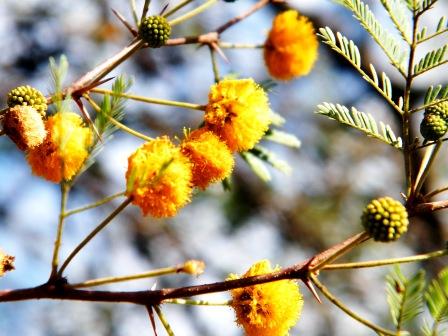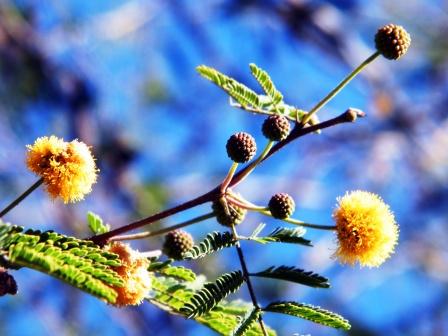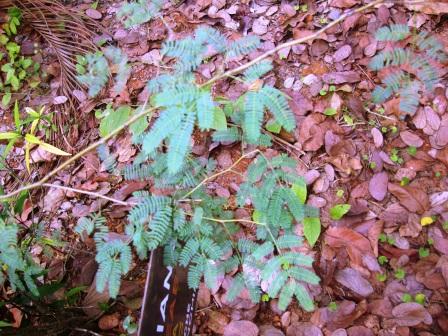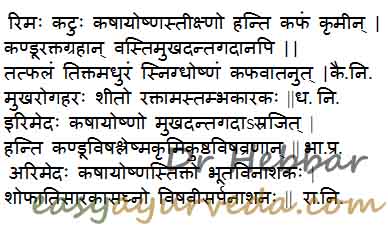Irimeda, Arimeda, Acacia farnesiana: Uses, Dose, Side Effects
Irimeda- Acacia farnesina Wild. is an Ayurvedic herb used for relieving pain and inflammation of the tissues, bronchitis and in controlling the bleeding from wounds.

Botanical Name- Acacia farnesiana Wild, Vachellia farnesiana, Mimosa farnesiana
Family- Mimosaceae
Table of Contents
Vernacular names
English name – Sweet acacia, Needle bush, Mimosa bush, Perfume Acacia (flower is used for preparing perfumes -Cassie), Cassie flower, Ironwood, Sweet acacia, Sweet wattle
Hindi name – Guh baboool, Gukikar, Gandh babool
Kannada name – Kasturigibbali
Manipuri name – Chigong lei
Bengali name – Guyababula
Marathi name – Gukikar
Telugu name – Nagatumma
Tamil name – Kadivel, Kasthurivel,
Assamese name – Tarua kadam
Sanskrit Synonyms
Arimeda, Raamaka, Sarvameda, Skandha, Ahimeda, Arima, Medoripu, Ahimeda, Ahimara, Pootimeda, Kalaskandha
Arimajam – The plant is popularly known as Arimanja
Safed Babul- Resembles Babul plant (Acacia Arabica Wild.)
Vitkadhir – Like plant of Khadira (Acacia cathechu Wild.) but with foul smelling roots.

Categorization
Classical categorization:
Charaka Samhita
Udara Prashamana group of herbs useful in treating tinea infection
Sanjasthapana – group of herbs useful in restoring consciousness.
Susruta – Salasaradi varga
Raja Nighantu: Shalmalyadi Varga
Bhavaprakasha: Vatadi Varga
Dhanvantari Nighantu: Amradi Varga
Kaiyadeva Nighantu: Oshadhi Varga
Systemic classification
Kingdom: Plantae
Phylum: Spermatophyta
Sub Phylum: Angiospermae
Class: Dicotyledonae
Habitat, properties
Irimeda is a small tree growing upto a height of 6- 8 meters in the dry regions of India like Rajasthan, Madhya Pradesh and Maharashtra. The plant bears small, fragrant yellow flowers
Properties
Rasa (Taste) – Kashaya – Astringent, Tikta- Bitter
Guna (Qualities) – Laghu – Light for digestion, Ruksa- Dry in nature
Vipaka- Katu- Pungent after digestion
Veerya (Potency) – Sheeta – Cold
Effect on Tridosha- Irimeda is kapha pitta shamaka (reduces the vitiated kapha and pitta dosha)
Morphology
Deciduous tree
Leaves – Compound
Flowers – Yellow, arranged in terminal panicle
Fruits – Pods, Black in colour

Major chemical constituents
The rootbark of the plant Acacia farnesina Wild. contain leucophleol, leucoxol and leucophleoxol. The plant also contains Aromadendrin, Naringenin, Galloylglucose, Ethyl Gallate as the other chemical constituent. (Dravya Guna Vijnana by JLN Shastry)
Bark is rich in tannins.
Leaves are used as Chutney along with tamarind.
In Europe, a perfume derived from its flowers – Cassie is used.
Part used, Dosage, Uses
Part Used: Stem, Bark, Heart- Wood
Dosage: 40-50 ml of decoction in divided doses
Powder – 1- 3 g
Paste of the bark for external application in treating inflammation
Uses of the plant Irimeda:
- The decoction of the plant Acacia farnesina Wild. is used for gargling in the diseases related to oral cavity like dental caries, inflamed and infected gums.
- The decoction of the bark of the plant Irimeda in a divided dose of 40-50 ml is consumed in treating diarrhea.
- The paste prepared from the powder of the heart wood is applied to treat localized inflammation, pain due to insect bite.
- The decoction of the plant is also used in divided dose of 40-50 ml to treat cough.
- The leaves of the plant Acacia farnesina Wild. is used to treat syphilitic ulcers and is anti- bacterial in nature.
- The extract of the aerial parts of the plant Acacia farnesina Wild. is hypotensive and central nervous system depressant in nature.
- The paste of the seeds of Irimeda is used to control bleeding from wounds.
- An alcoholic preparation called as ‘Arishta’ is prepared from the plant Irimeda to treat distention of the abdomen. It is given in a dose of 90-100 ml per day in divided dose.
Sanskrit verse

Indications
Traditional indications:
Kaphaja Krumi – worm infestation of Kapha origin
Kandu – itching, pruritis
Raktadosha – blood impurity and vitiation disorders such as acne, skin diseases, bleeding disorders etc
Basti Dosha – Urinary tract disorders
Mukha Dosha, Danta Dosha – diseases of mouth and teeth. Useful in treating mouth ulcers, to stop and reverse tooth decay. For this reason, it is used as ingredient in Irimedadi taila – an oil for oil pulling to treat dental and mouth disorders and in Geecare dentrifice
Raktastambhaka – useful in bleeding disorders.
Visha – Toxic conditions, poisoning
Kushta – skin diseases
Bhutahara – useful in psychiatric disorders
Graharoga – Psychiatric disorders
Shopha – inflammation
Atisara – diarrhoea, dysentery
Kasa – cough, cold
Visarpa – herpes
Fruit is bitter, sweet, Snigdha – unctuous, oily, Ushna – hot
Balances Kapha and Vata Dosha
Interaction with medicines, supplements
Can this be used while taking Homeopathic medicine?
Yes. This product does not react with homeopathic medicine.
Can
this medicine be continued while taking supplements like multivitamin tablets,
Omega 3 fatty acids etc?
Yes. Generally, this product goes well with most
of the dietary supplements. However, if you are taking more than one product
per day, please consult your doctor for an opinion.
With western
medicines
Seek your
doctor’s advice if you are taking this product along with other western
(allopathic / modern) medicines. Some Ayurvedic herbs can interact with modern
medicine.
If both Ayurvedic and allopathic medicines are advised together, then it is
best to take Allopathic medicine first, wait for 30 minutes and then take the
Ayurvedic medicine.
Ayurvedic formulations
Formulation containing Irimeda:
Arimedadi Tailam– This oil is used for gargling or oil pulling to strengthen the tooth, treat tooth decay, foul breath.
Khadiradi vati– It is a tablet used to treat oral ulcers, bad breath, and cough. The tablet is kept in the mouth and sucked slowly to get the proper benefit.
Research
Research articles on Acacia farnesina Wild.
- The water extract of the herb Acacia farnesiana significantly lowered the blood glucose level.
- The presence of phenols, steroid, tannins, flavanoids in the herb irimeda exhibit anti microbial activity.
- The pod extract of the plant showed anti oxidant activity in experimental study.
- The leaf extract of the plant Acacia farnesiana showed anti microbial and cyto toxic activity.
Authors:
Dr.B.K.Prashanth M.D (Ayu), Ph.D (E mail: drprashanthbk@gmail.com) and Dr Hebbar










